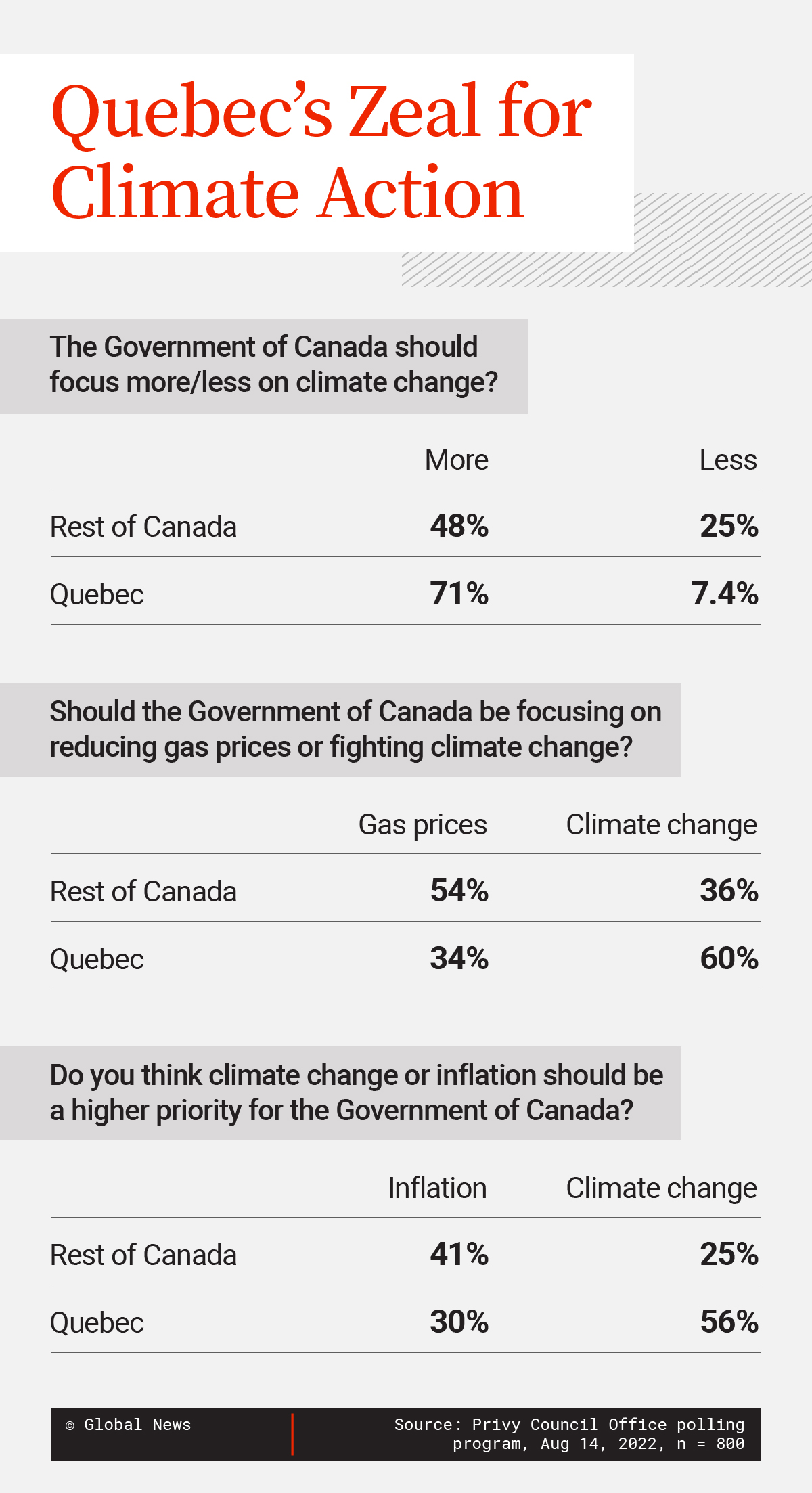Newly released internal federal government polling shows that voters in Quebec are much keener to see the federal government do more to fight climate change and that climate change is a bigger problem than inflation or lowering gas prices.

And because of the electoral volatility of many seats in Quebec, any party that wishes to form government in Ottawa — including the incumbent Liberals — must account for the extraordinary zeal Quebecers have for ‘green’ policies. The political implication for the Trudeau Liberals, who hold 35 of the province’s 78 seats in the House of Commons, is that Quebec is in a position to have an outsize influence on national climate, energy and environment policies.
“I try to explain to people here that it’s the reason (the Liberals) take into account Quebec more than, let’s say, Alberta,” said Duane Bratt, a political science professor at Mount Royal University in Calgary. “It’s not just the seat count. It’s that (Quebecers) change parties. It’s a four-party system.” The Bloc Québecois is second to the Liberals with 32 seats, the Conservatives have nine seats, the NDP have one and there is one independent.
Every party that holds seats in the National Assembly in Quebec, including the governing Coalition Avenir Quebec, agrees on the priority of climate action and the environment though they may argue over the pace of that action and some details.
Unlike media in English Canada, few, if any, climate skeptics get much of a platform in Quebec media. One reason: most Quebecers now see their reputation as the country’s premiere green province as a crucial part of their identity, one of the things that differentiate Quebec culture and society from other provinces.
“I think Quebec nationalism, in a way, now sees itself as being green, or the idea that Quebec is greener than other provinces has now become part of provincial identity,” said Daniel Béland, a political science professor and director of the McGill Institute for the Study of Canada in Montreal. “There’s a strong consensus among Quebec politicians, too, over the environment.”
Experts also say the structure of Quebec’s economy, the dominance of clean hydroelectric power, and the near absence of any kind of fossil fuel industry have contributed to Quebec’s commitment to climate action.

Get daily National news
“You wonder if Alberta was a hydro province and Quebec was a fossil fuel province, if those attitudes would be diametrically opposite,” said Bratt. “Same thing when you look at British Columbia, there’s a huge gap between Vancouver Island, Greater Vancouver and Interior B.C. What is striking is that we don’t see that gap in Quebec.”

Indeed, in many smaller cities and rural areas in Quebec – from Abitibi to the Mauricie to the Saguenay – the Bloc Québocois has flourished. The BQ has a much more aggressive climate action platform than the Liberals.
“The Liberals are approaching the environment in Quebec knowing that it’s very important for Quebeckers on average, more than for people in other provinces,” said Béland. “The Liberals have to compete with the Bloc in Quebec. And the Bloc is quite green.”
Indeed, BQ MPs often attack the Trudeau Liberals in the House of Commons for being beholden to the energy sector in Western Canada.
“So the question the parties have to think about is protecting their base of support and expanding their base,” said Bratt.
Quebec’s unique-in-the-country attitudes on climate and the environment-sense of being green were unearthed in a series of polls conducted by the Privy Council Office through the late spring and summer of 2022 – polling data just recently released to Global News as a result of a federal access to information request.
The PCO conducts weekly live-agent polls of all Canadians on a range of issues and, in its Aug. 14 survey, it asked respondents if the government should “focus more or focus less” on climate change. Counting just the responses from outside Quebec, 48 per cent said more and 25 per cent said less. But for Quebec only, a whopping 71 per cent said Ottawa should focus more on climate change and just 7.4 per cent said Ottawa should focus less.
The PCO poll also asked if the government of Canada “should be focusing on reducing gas prices or fighting climate change?” A majority in the rest of Canada — 54 per cent — picked “reducing gas prices” but in Quebec, 60 per cent picked “fighting climate change.”

Asked if climate change or inflation should be a higher priority for Ottawa, the pattern held again. While 41 per cent of respondents outside Quebec chose inflation compared to 25 per cent who chose climate change, among respondents in Quebec a clear majority, or 56 per cent, picked climate change while 30 per cent picked inflation.
During its polling for the weeks ending July 10 and again for the week ending July 17, respondents were asked if they “support or oppose (the) national price on carbon pollution,” known more commonly as the carbon tax. Among respondents in the rest of Canada, there was 40 per cent in favour and 32 per cent opposed. But in Quebec, 62 per cent support carbon pricing while just 21 per cent oppose it.
The polling data obtained by Global News is “raw data” and does not contain explanations about potential margins of error. That said, the data provided does not indicate the size of the sample in all instances. For that carbon tax question, though, 1,520 people in the rest of Canada were asked that question over the two weeks while 380 Quebecers were sampled in that period.














Comments
Want to discuss? Please read our Commenting Policy first.